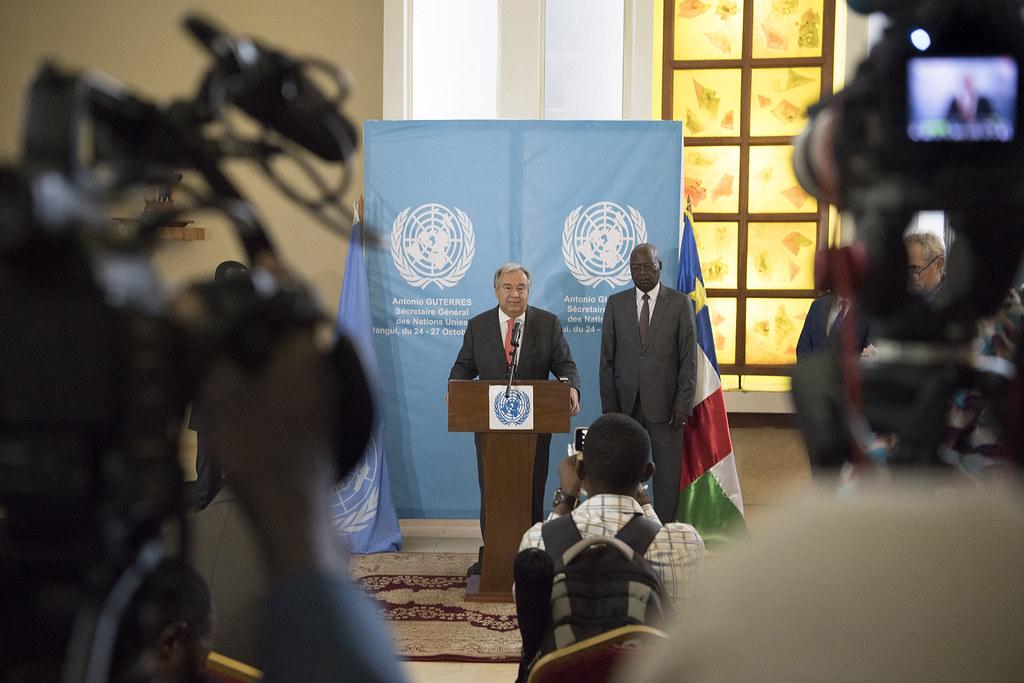The three ways states are using COVID-19 to curb media freedoms

We cannot afford for media freedoms to fall victim to COVID-19.

Across the world, governments have clamped down on media rights during the COVID-19 pandemic. Credit: UN Photo/Eskinder Debebe
Read all our COVID-19 coverage
As the world grapples with the speed and scale of the devastation wreaked by COVID-19, the need for access to trusted, accurate and independent information has never been so acute. With global mortality rates showing no signs of slowing, the world’s economy knocked off its axis, and society at a standstill, there is no precedent to this emergency. We are fighting it blindfolded. Each day is costing us thousands of lives. But without the vital free-flow of information – lessons from other countries, warnings from medics, expertise from scientists, guidance to the public – we stand no chance of fighting it at all.
A free and vibrant media is more important than ever. Yet one of most catastrophic fallouts of this crisis is that it is paving the way for a crackdown on press freedoms across the world.
A dangerous pattern seems to be emerging. It sees some governments increasingly taking advantage of the pandemic to instigate measures – on a sliding scale of severity – that place restrictions on news coverage. In the short term, these are extremely damaging. But the long-term consequences of suppressing independent journalism could significantly erode civil liberties.
Why is this happening? There are three main reasons for state-led curbing of media freedoms.
1) To control the narrative
The first is that some governments are acting primarily to counter the rapid spread of misinformation fuelled by a heightened reliance on social media and increased thirst for news. But the measures taken by these countries – even by democratic nations that have hitherto encouraged a thriving and diverse media – are unprecedented.
Just a month ago, the government of South Africa passed a new law that criminalises disinformation about COVID-19, carrying penalties of imprisonment. The move has raised concerns from global media freedom organisations, including the Committee to Protect Journalists, who point out that the government should focus on providing reliable information to counter disinformation rather than paving the way for press censorship.
In the UK, the government’s strong response to certain critical media coverage of its handling of the crisis has even prompted Richard Horton, editor of the Lancet medical journal, to accuse the government of “deliberately rewriting history in its ongoing Covid-19 disinformation campaign”.
Meanwhile, Prime Minister Narendra Modi has issued a series of requests encouraging India’s leading news outlets to publish “inspiring and positive stories” about the government’s response to the pandemic, citing a need to push back on “rumour” and “negativity”.
2) To silence criticism
The second reason for restricting press freedoms is to actively suppress news reporting that could lead to criticism of the government’s policy and leadership.
President Trump has drawn criticism from media freedom organisations after openly calling out reporters asking questions about his handling of the crisis during press briefings. In Serbia, there have been reports that journalists have been arrested for reporting on medical equipment shortages. In Slovenia and the Czech Republic, they are prevented from attending press briefings altogether.
Meanwhile in March, Egypt expelled The Guardian’s Ruth Michaelson following her story on a study by a team of infectious disease specialists that questioned the country’s official tally of coronavirus cases. Similarly, in April, Iraq suspended the licence of Reuters news agency for reporting on a discrepancy between official and “actual” COVID-19 figures. The suspension was later lifted.
3) To seize more powers
Finally, in countries where a free press is already under attack, the move to control information “for the public good” is being exploited to further seize political power. Just three weeks ago in Hungary, parliament passed a law that authorises Prime Minister Viktor Orbán to rule by decree, handing him unprecedented emergency powers of the country, ostensibly until the end of the pandemic. A five-year prison sentence threatens anyone who spreads “false information”. The measures have drawn severe criticism from the European Commission with 13 member states issuing a joint statement expressing deep concern about their potential impact on fundamental rights and freedoms.
Jordan’s recently declared state of emergency gives Prime Minister Omar Razzaz power to “monitor the content of newspapers, ads, and any other method of communication prior to publication, and to censor and shut down any outlet without justification” alongside a raft of other restrictions. Violation of the law can lead to prison sentences.
Meanwhile China is insisting that its authoritarian measures – which has included revoking the visas of a large number of international press – has led to success in controlling the virus. This is difficult to dispute without a free press. Freelance journalist Li Zehua, one of the first to report on the pandemic, remains missing.
From arrests in Venezuela and Turkey; to Romania’s emergency decree that allows authorities to shut down websites and remove content deemed to be “fake news”; to Russia, where new laws are being used to censor reports about the pandemic; the law is being weaponised against press freedom. Journalists are being silenced. If left unchecked, the real and devastating consequences for free access to information will be lasting and catastrophic.
Media freedoms the bedrock of democracy
At the Thomson Reuters Foundation, we use the combined power of journalism and the law to defend and promote media freedom, the very bedrock of democracy. Our most immediate response to the pandemic includes working with partner organisations – including the World Economic Forum, the Global Fund, Google and the OECD – to scale journalism capacity in countries where the pandemic is next looming.
COVID-19 has claimed many lives. But we cannot let a free press fall victim to this pandemic.





